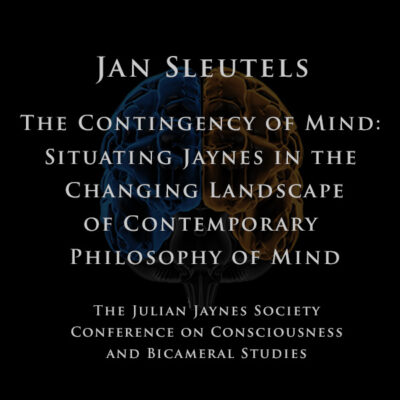Description
Audio download of Ted Remington’s lecture “Jaynes, Metaphor, and the Rhetorical Structuring of Consciousness.”
From the Julian Jaynes Society Conference on Consciousness and Bicameral Studies.
Summary: If Julian Jaynes had done nothing but write Chapter 2 of Book I of The Origin of Consciousness in the Breakdown of the Bicameral Mind (OC hereafter), rhetoricians would be in his debt. In this chapter, Jaynes offers a detailed explanation of how metaphor — a preoccupation of rhetoric from its beginnings as a discipline in ancient Athens — works on a tactical, cognitive level. Even without this broader context of his argument in OC, Jaynes offers rhetoricians a helpful vocabulary with which to talk and think about metaphor, one that builds on work done in the twentieth century by students of rhetoric, particularly I.A. Richards, whose The Philosophy of Rhetoric is one of the most influential works on rhetoric that have appeared in the last 100 years.
But of course, Jaynes’s discussion of metaphor is but the groundwork for his argument that human consciousness is a relatively recent phenomenon intimately tied to language use and metaphor. If Jaynes’s specific thoughts on the workings of metaphor are valuable in and of themselves to rhetoricians, the consequences of these thoughts and the larger use to which Jaynes puts them offer untold riches to those of us who wish to more fully understand the role rhetoric plays in the world.
In this presentation, the author suggests that we can see Jaynes’s treatment of metaphor as a continuation of a line of thought that emerges from Richards’s The Philosophy of Rhetoric. While never citing Richards in OC, Jaynes advances two of Richards’ main arguments: that metaphor plays a much more central role in thought than it is traditionally given and that a more exact vocabulary is necessary to understand how metaphor works as a way of structuring our understanding of the world. The author points to ways in which Jaynes advances Richards’s thought significantly, particularly in his discussion of the role of the paraphrand in metaphor. This puts an even greater emphasis on the rhetorical nature of metaphor.
Second, the author suggests that Jaynes’s work links a line of thought on metaphor dominated by poetic/rhetorical thought (e.g., Richards) with a growing interest in metaphor that emerges over the course of the twentieth century in the fields of linguistics and psychology. As such, Jaynes’s treatment of metaphor is a particularly powerful and important instrument in thinking about metaphor.
Lastly, the author concludes by suggesting that, put in the larger context of Jaynes’s ideas about consciousness, his treatment of metaphor opens up opportunities to better understand how the study of rhetoric intersects with the study of consciousness, and suggests a central role for rhetoric in defining who we are.
All audio files are in mp3 format. Upon payment you will receive a link to download the file.




